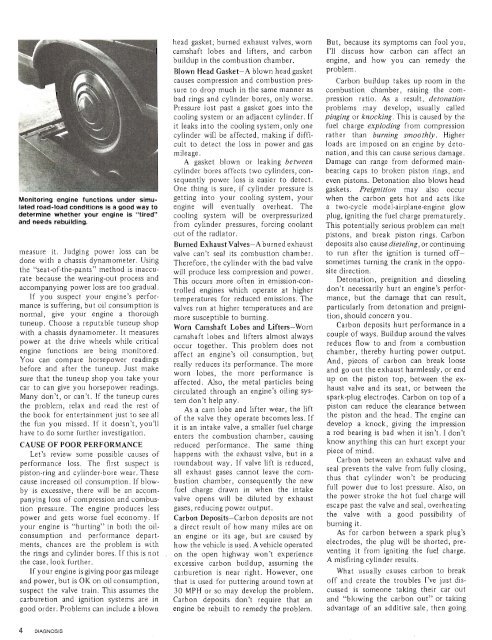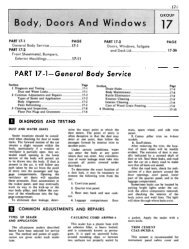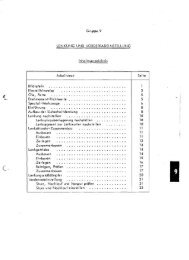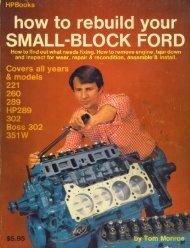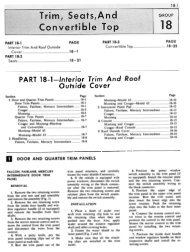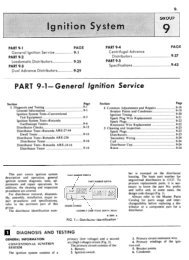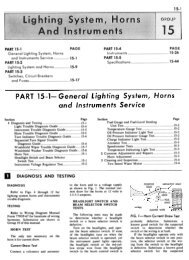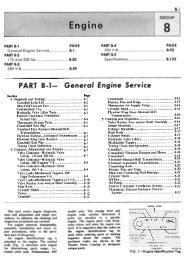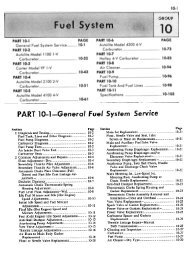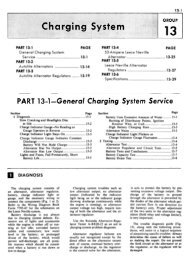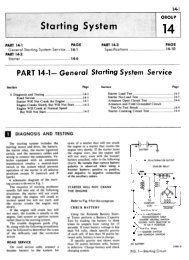How To Rebuild Your Ford V-8 351C-351M-400-429-460.pdf - Index of
How To Rebuild Your Ford V-8 351C-351M-400-429-460.pdf - Index of
How To Rebuild Your Ford V-8 351C-351M-400-429-460.pdf - Index of
You also want an ePaper? Increase the reach of your titles
YUMPU automatically turns print PDFs into web optimized ePapers that Google loves.
Monitoring engine functions under simulated<br />
road-load conditions is a good way to<br />
determine whether your engine is "tired"<br />
and needs rebuilding.<br />
measure it. Judging power loss can be<br />
done with a chassis dynamometer. Using<br />
the "seat-<strong>of</strong>-the-pants" method is inaccurate<br />
because the wearing-out process and<br />
accompanying power loss are too gradual.<br />
If you suspect your engine's performance<br />
is suffering, but oil consumption is<br />
normal, give your engine a thorough<br />
tuneup. Choose a reputable tuneup shop<br />
with a chassis dynamometer. It measures<br />
power at the drive wheels while critical<br />
engine functions are being monitored.<br />
You can compare horsepower readings<br />
before and after the tunetip. Just make<br />
sure that the tuneup shop you take your<br />
car to can give you horsepower readings.<br />
Many don't, or can't. If the tuneup cures<br />
the problem, relax and read the rest <strong>of</strong><br />
the book for entertainment just to see all<br />
the fun you missed. If it doesn't, you'll<br />
have to do some further investigation.<br />
CAUSE OF POOR PERFORMANCE<br />
Let's review some possible causes <strong>of</strong><br />
performance loss. The first suspect is<br />
piston-ring and cylinder-bore wear. These<br />
cause increased oil consuniption. If blowby<br />
is excessive, there will be an accompanying<br />
loss <strong>of</strong> conlpression and combustion<br />
pressure. The engine produces less<br />
power and gets worse fuel economy. If<br />
your engine is "hurting" in both the oilconsumption<br />
and performance departments,<br />
chances are the problem is with<br />
the rings and cylinder bores. If this is not<br />
the case, look further.<br />
If your engine is giving poor gas mileage<br />
and power, but is OK on oil consumption,<br />
suspect the valve train. This assumes the<br />
carburetion and ignition systems are in<br />
good order. Problems can include a blown<br />
head gasket, burned exhaust valves, worn<br />
camshaft lobes and lifters, and carbon<br />
buildup in the combustion chamber<br />
Blown Head Gasket-A blown head gasket<br />
causes compression and conlbustion pressure<br />
to drop much in the same manner as<br />
bad rings and cylinder bores, only worse.<br />
Pressure lost past a gasket goes into the<br />
cooling system or an adjacent cylinder. If<br />
it leaks into the cooling system, only one<br />
cylinder will be affected, making if difficult<br />
to detect the loss in power and gas<br />
mileage.<br />
A gasket blown or leaking between<br />
cylinder bores affects two cylinders, consequently<br />
power loss is easier to detect.<br />
One thing is sure, if cylinder pressure is<br />
getting into your cooling system, your<br />
engine will eventually overheat. The<br />
cooling system will be overpressurized<br />
from cylinder pressures, forcing coolant<br />
out <strong>of</strong> the radiator.<br />
Burned Exhaust Valves-A burned exhaust<br />
valve can't seal its combustion chamber.<br />
Therefore, the cylinder with the bad valve<br />
will produce less compression and power.<br />
This occurs more <strong>of</strong>ten in emission-controlled<br />
engines which operate at higher<br />
temperatures for reduced emissions. The<br />
valves run at higher temperatures and are<br />
more susceptible to burning.<br />
Worn Camshaft Lobes and Lifters-Worn<br />
camshaft lobes and lifters almost always<br />
occur together. This problem does not<br />
affect an engine's oil consumption, but<br />
really reduces its performance. The more<br />
worn lobes, the more performance is<br />
affected. Also, the metal particles being<br />
circulated through an engine's oiling system<br />
don't help any.<br />
As a cam lobe and lifter wear, the lift<br />
<strong>of</strong> the valve they operate becomes less. If<br />
it is an intake valve, a smaller fuel charge<br />
enters the combustion chamber, causing<br />
reduced performance. The same thing<br />
happens with the exhaust valve, but in a<br />
roundabout way. If valve lift is reduced,<br />
all exhaust gases cannot leave the combustion<br />
chamber, consequently the new<br />
fuel charge drawn in when the intake<br />
valve opens will be diluted by exhaust<br />
gases, reducing power output.<br />
Carbon Deposits-Carbon deposits are not<br />
a direct result <strong>of</strong> how many miles are on<br />
an engine or its age, but are caused by<br />
how the vehicle is used. A vehicle operated<br />
on the open highway won't experience<br />
excessive carbon buildup, assuming the<br />
carburetion is near right. <strong>How</strong>ever, one<br />
that is used for puttering around town at<br />
30 MPH or so may develop the problem.<br />
Carbon deposits don't require that an<br />
engine be rebuilt to remedy the problem.<br />
But, because its symptoms can fool you,<br />
I'll discuss how carbon can affect an<br />
engine, and how you can remedy the<br />
problem.<br />
Carbon buildup takes up room in the<br />
combustion chamber, raising the compression<br />
ratio. As a result, detorzatio~z<br />
problems may develop, usually called<br />
pinging or knocking. This is caused by the<br />
fuel charge exploding from compression<br />
rather than burning smoothly. Higher<br />
loads are imposed on an engine by detonation,<br />
and this can cause serious damage.<br />
Damage can range from deformed mainbearing<br />
caps to broken piston rings, and<br />
even pistons. Detonation also blows head<br />
gaskets. Preignition may also occur<br />
when the carbon gets hot and acts like<br />
a two-cycle model-airplane-engine glow<br />
plug, igniting the fuel charge prematurely.<br />
This potentially serious problem can melt<br />
pistons, and break piston rings. Carbon<br />
deposits also cause dieseling, or continuing<br />
to run after the ignition is turned <strong>of</strong>fsometimes<br />
turning the crank in the opposite<br />
direction.<br />
Detonation, preignition and dieseling<br />
don't necessarily hurt an engine's performance,<br />
but the damage that can result,<br />
particularly from detonation and preignition,<br />
should concern you.<br />
Carbon deposits hurt performance in a<br />
couple <strong>of</strong> ways. Buildup around the valves<br />
reduces flow to and from a combustion<br />
chamber, thereby hurting power output.<br />
And, pieces <strong>of</strong> carbon can break loose<br />
and go out the exhaust harmlessly, or end<br />
up on the piston top, between the exhaust<br />
valve and its seat, or between the<br />
spark-plug electrodes. Carbon on top <strong>of</strong> a<br />
piston can reduce the clearance between<br />
the piston and the head. The engine can<br />
develop a knock, giving the impression<br />
a rod bearing is bad when it isn't. I don't<br />
know anything this can hurt except your<br />
piece <strong>of</strong> mind.<br />
Carbon between an exhaust valve and<br />
seal prevents the valve from fully closing,<br />
thus that cylinder won't be producing<br />
fill1 power due to lost pressure. Also, on<br />
the power stroke the hot file1 charge will<br />
escape past the valve and seal, overheating<br />
the valve with a good possibility <strong>of</strong><br />
burning it.<br />
As for carbon between a spark plug's<br />
electrodes, the plug will be shorted, preventing<br />
it from igniting the fuel charge.<br />
A misfiring cylinder results.<br />
What usually causes carbon to break<br />
<strong>of</strong>f and create the troubles I've just discussed<br />
is someone taking their car out<br />
and "blowing the carbon out" or taking<br />
advantage <strong>of</strong> an additive sale, then going


